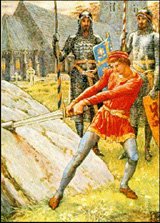
consanguinity –noun - Relationship by descent from a common ancestor; kinship; close relationship or connection.
Another five-syllable word!
I think the rule has been relaxed, but the Catholic church long forbade marriage in cases where the two parties had a common ancestor within seven generations.
And now, for (I hope) your amusement, here's an excerpt in middle-English of publisher William Caxton's preface to Sir Thomas Malory's (1405-1471) Le Morte D'Arthur. My daughter flew into a rage after reading this; "He'd get an F in my school!" etc.
AFter that I had accomplysshed and fynysshed dyuers hystoryes as wel of contemplacyon as of other hystoryal and wordly actes of grete conquerours & prynces / And also certeyn bookes of ensaumples and doctryne / Many noble and dyuers gentylmen of thys royame of Englond camen and demaunded me many and oftymes / wherfore that I haue not do made & enprynte the noble hystorye of the saynt greal / and of the moost renomed crysten kyng / Fyrst and chyef of the thre best crysten and worthy / kyng Arthur / whyche ought moost to be remembred emonge vs englysshe men tofore al other crysten kynges / For it is notoyrly knowen thorugh the vnyuersal world / that there been ix worthy & the best that euer were / That is to wete thre paynyms / thre Iewes and thre crysten men / As for the paynyms they were tofore the Incarnacyon of Cryst / whiche were named / the fyrst Hector of Troye / of whome thystorye is comen bothe in balade and in prose / The second Alysaunder the grete / & the thyrd Iulyus Cezar Emperour of Rome of whome thystoryes ben wel kno and had / And as for the thre Iewes whyche also were tofore thyncarnacyon of our lord of whome the fyrst was Duc Iosue whyche brought the chyldren of Israhel in to the londe of byheste / The second Dauyd kyng of Iherusalem / & the thyrd Iudas Machabeus of these thre the byble reherceth al theyr noble hystoryes & actes / And sythe the sayd Incarnacyon haue ben thre noble crysten men stalled and admytted thorugh the vnyuersal world in to the nombre of the ix beste & worthy / of whome was fyrst the noble Arthur / whos noble actes I purpose to wryte in thys present book here folowyng / The second was Charlemayn or Charles the grete / of whome thystorye is had in many places bothe in frensshe and englysshe / and the thyrd and last was Godefray of boloyn / of whos actes & lyf I made a book vnto thexcellent prynce and kyng of noble memorye kyng Edward the fourth / the sayd noble Ientylmen Instantly requyred me temprynte thystorye of the sayd noble kyng and conquerour kyng Arthur / and of his knyghtes wyth thystorye of the saynt greal / and of the deth and endyng of the sayd Arthur / Affermyng that I out rather tenprynte his actes and noble feates / than of godefroye of boloyne / or ony the other eyght / consyderyng that he was a man borne wythin this royame and kyng and Emperour of the same / And that there ben in frensshe dyuers and many noble volumes of his actes / and also of his knyghtes / To whome I answerd / that dyuers men holde oppynyon / that there was no suche Arthur / and that alle suche bookes as been maad of hym / ben fayned and fables / by cause that somme cronycles make of hym no mencyon ne remembre hym noo thynge ne of his knyghtes / wherto they answerd / and one if specyal sayd / that in hym that shold say or thynke / that there was neuer suche a kynge callyd Arthur / myght wel be aretted grete folye and blyndenesse / For he sayd that there were many euydences of the contrarye / Fyrst ye may see his sepulture in the monasterye of Glastyngburye / And also in polycronycon in the v book the syxte chappytre / and in the seuenth book the xxiij chappytre/ where his body was buryed and after founden and translated in to the sayd monasterye / ye shal se also in thystorye of bochas in his book de casu principum / parte of his noble actes / and also of his falle / Also galfrydus in his brutysshe book recounteth his lyf / and in dyuers places of Englond / many remembraunces ben yet of hym and shall remayne perpetuelly / and also of his knyghtes.
2 comments:
Wonderful!
It's amazing we have books at all after an example like that. I wonder when we decided to fixate on spelling, and thus improve the quality of writing(?)
Standardized spelling, as far as I know, didn't really get started until the early 19th century. Noah Webster (of dictionary fame) got the ball rolling. He had less luck simplifying spelling. For example we now write 'color' and not the English 'colour;' but we still write 'enough' and not 'enuf.' I believe I got this from Daniel Boorstin's "The Americans: The Colonial Experience", the first book in a great trilogy.
Post a Comment